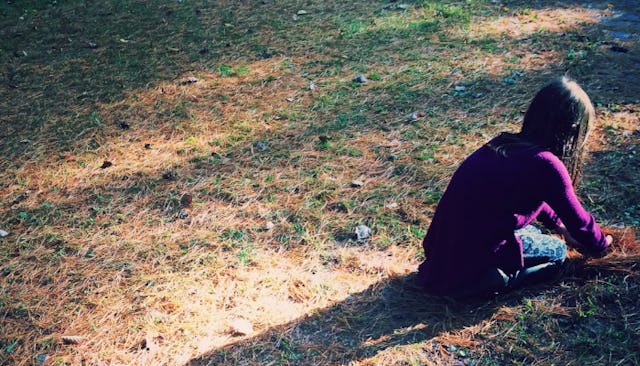Talking To My Tween Daughter About Mortality

“I want a gravestone with writing, okay? Promise me it will have writing so that there can be people who will read it. I want to be remembered,” she said as tears coursed down her face and collected in the polka dot pillowcase beneath her cheek.
My eldest daughter is two weeks shy of her 11th birthday and has no reason to be planning the details of her funeral and burial. She has a sunny disposition, a wicked sense of humor, a passion for Taylor Swift, and a growing preoccupation with death. It seems to be one of the emerging emotional surprises of puberty. I’ve silently clucked my tongue at bedtime as I concede that many of the things that haunted me as a child or frazzled my parents are resurfacing as I raise my own kids.
RELATED: 14 Funeral Songs To Help Honor A Late Loved One
Death and the capriciousness of when it comes are unavoidable topics in a world with screens broadcasting the 24-hour hate and slaughter cycle. I regulate my news intake, but it is harder and harder to do with my kids. Not having all the answers about death feels somehow less forgivable than struggling to get a toddler to eat vegetables or take naps.
My fixation on death started when I was 7 and was less about my own death than it was about losing the people closest to me. My parents’ divorce was still five years away, but a persistent fear of abandonment consumed me. I remember hearing the Diane Downs story when I was a kid, a mom one town over from us who killed her daughter and tried to kill her other two children. I was a year younger than my daughter, and it rocked me. Remembering those worries makes trying to dismiss my daughter’s impossible.
My daughter’s fears have forced my hand on religion, the afterlife, and the “promise me you won’t die” pacts made in whispers.
“Do you believe, Mom? Do you believe that there is a Heaven?” she asked with panic in her voice.
“I believe that something happens and that parts of us live on,” I answered.
“Where and how? What do you call it? Is it Heaven?”
I paused. Where is the line between false hope and affording the comfort of possibility? We don’t go to church. We have not taught the girls the story of the Bible, nor do I want to or think that I could.
“I believe that we get what we need when we die—there is no more pain and we go to the happiest time we ever experienced,” I told her.
“When were you your happiest? Was it when you were a kid? That was before you had me. How will we find each other?” Her weeping was becoming more forceful.
“All I know is that there are times when I am going about my day and I can feel Grandpa. The sound of his voice comes back to me, the smell of his sport-coat, and the feel of his whiskers on my face. I can’t do it whenever I want, but it does happen and it feels like he isn’t completely gone. Does that make sense?” I asked, knowing that there is no way any of this can make sense.
“Grandma says that Buddha believes that you are reborn into another family. I am just so scared because how will I find you if I go to a new family.”
I smiled, “Honey, we’re not Buddhist.”
“But truly, Mom, how will you find me?” She stared at me, completely confident that I had an answer that would wrap this conversation up in a shiny, comforting bow.
“I would know you anywhere. You know how people do song covers, and you can recognize the original behind the new voice? It will be like that. We’ll know each other’s song.”
She nodded and drew a ragged breath.
“Here is what I know, sweet girl. I am trying to make choices every day to be as healthy as I can. I’m also trying to do things and teach things that will always be with you. You know how I say it’s my job to give you the tools to make the right decisions when I’m not around or when no one is looking? I’m hoping we can do that with love.”
“But what if I die or get killed before you? How will I ever find you? How will I know what to do?” I stared back at her, my eyes filling with tears.
“I don’t know.”
Her eyes bugged out, “Okay, then what do we do? How do we know?” She was wailing, and I felt like I was bleeding.
I touched her face and kissed her shoulder. “We take every moment here, and we store it deep inside of ourselves. Our whispered “I love you”s and the laughing after I put you to bed, all those parts of us become a light that we use as we grow up or get scared. You won’t be lost,” I said.
“I just want to be remembered and not feel alone.”
“I don’t want you to feel alone either, baby.” We cuddled and wept, her question still unanswered.
This article was originally published on